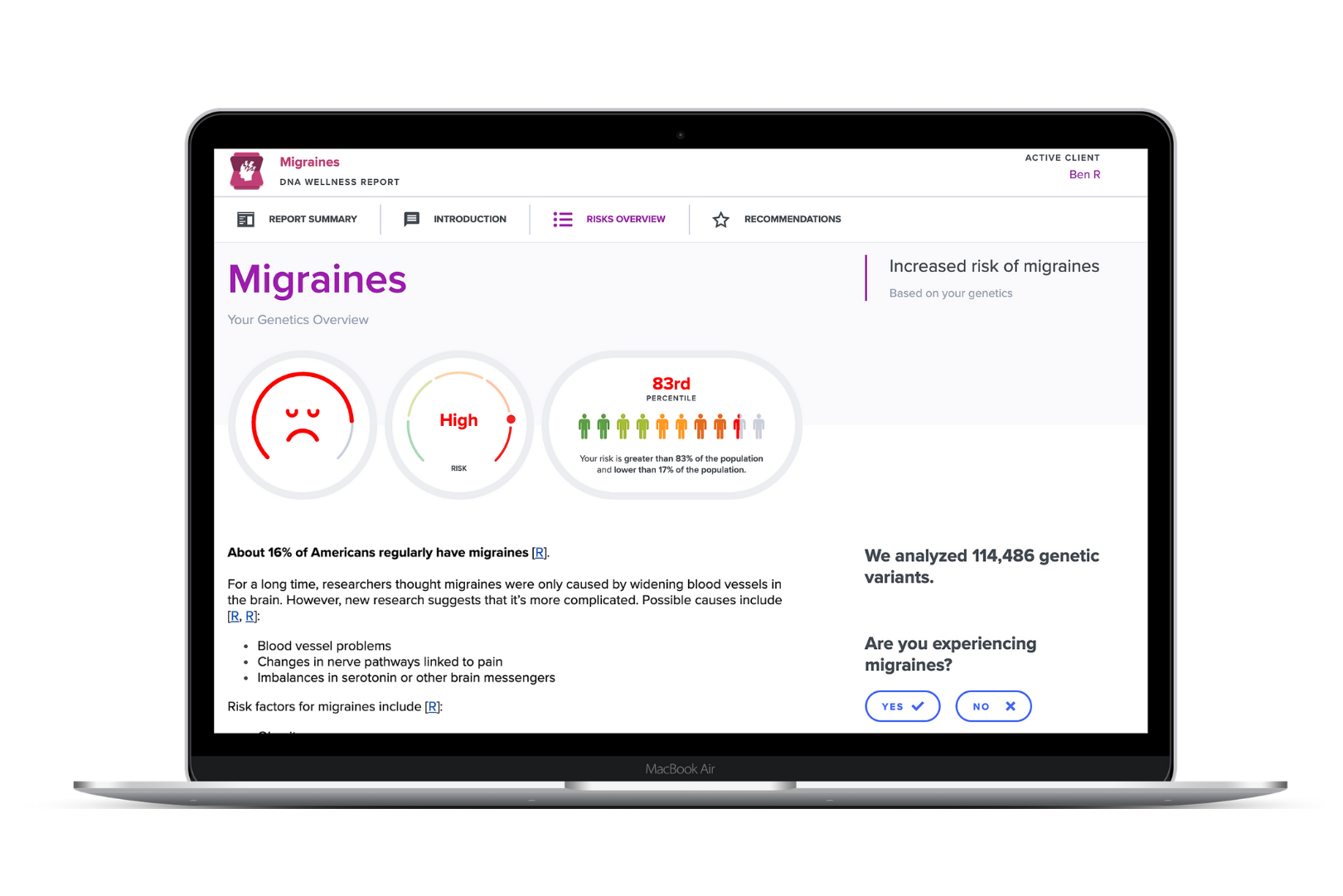This case study shows how an integrative health practitioner utilized his client’s genetic information to address the root cause of a chronic migraine condition.
Overview: Precision Health Using Genomics
Client “A”, let’s call him Ben, had been trying to solve his chronic migraine problem for years. Having recently recovered from a chronic heart issue, he was ready to tackle this problem too. He had visited doctors on numerous occasions for advice, made changes to his diet, tried medications, but they were unable to provide him with satisfactory results.
Finally, Ben reached out to an integrative health practitioner who was utilizing the SelfDecode Pro platform. This allowed his new practitioner to address his issues using a holistic and personalized approach based on his genetics and lab tests.
After the consulting period, Ben was able to take this new knowledge and advice and continue implementing an action plan that would provide relief for his symptoms. Digging into his genetics was the key to his success!
Interested in working with a DNA health coach? Apply to our consultation program here.
The Objective: The Role of Genetics in Chronic Migraines
Ben made it clear from the beginning that he desired to address his migraine issue. While there were other health issues, Ben’s migraines were having the biggest negative effect on his life at the time.
Interestingly, Ben had a family history of several significant health issues, including migraines. This was a clue to a genetic connection, as was the indication that he found symptom relief from caffeine, a vasoconstrictor.
Once Ben’s SelfDecode reports were generated, his integrative health practitioner discovered several relevant risk factors.

The SelfDecode Migraine Report indicated the following genetic risk factors:
- AOC1. Commonly referred to as “DAO”, this digestive enzyme can help break down histamine in the gut. Variants in this gene are related to increased levels of histamine, which can dilate blood vessels. Vasodilation is a known mediator of migraines.
After uploading Ben’s lab test results, the SelfDecode Lab reports also indicated vitamin and mineral deficiencies. The general intake for Ben indicated to the practitioner that he was being proactively healthy about his diet, so his practitioner would never have thought to look at his diet if it weren’t for his DNA Wellness Report.
The AOC1 variant meant there was a higher risk that Ben had too much histamine in his system. This can lead to too much vasodilation. His vitamin and mineral deficiencies put him more at risk for migraines. So, even though he was making good faith efforts to maintain a healthy diet, he was unaware of the potential problem related to his genes. Together, these intake factors allowed for the formation of an actionable plan for Ben to work with.
Want to see the SelfDecode Pro Connect platform in action? Learn more about how to use SelfDecode Pro Connect in your health practice and book a demo call here.
Results: The Course of Action
Ben came to his health consultant wanting to find out if his genetics might be a factor in his chronic migraines.
By looking at his DNA Wellness Reports Ben’s practitioner was able to confirm that his genetic variants put him at risk for higher histamine levels, which is a significant factor in migraines. Knowing this meant he could look into ways to mitigate this risk.
Ben’s practitioner advised him to look into an anti-histamine diet to help curb potentially excessive vasodilation. Due to the vitamin and mineral deficiencies, he was advised to take supplements, but also to remove any zinc supplementation, as that is known to interfere with absorption of magnesium. Both of these supplements would work to lower nitric oxide levels in the blood, which histamine can boost. Feverfew was suggested to help not only block serotonin, a known vasodilator but to inhibit the production of nitric oxide as well.
All of these recommendations were instantly provided to Ben’s health practitioner via the SelfDecode Pro platform once Ben’s DNA file had been analyzed. His health practitioner was then able to create a custom pdf report for Ben based on his results and complete with his prioritized recommendations.
Armed with this knowledge and advice, Ben took his recommendations forward with the renewed hope of finally getting relief for his symptoms. Without exploring his potential genetic risk factors, he might never have found these avenues to explore, and been left with the more disempowering options of medical advice that didn’t take into account his own unique genetic makeup.
Implications: What Can We Learn From This?
Before, Ben was on a wild goose chase looking for a cure to his chronic migraines. Unfortunately, none of the supplements or diets he tried ever relieved him of his pain.
Using a gene-based approach, Ben’s consultant skipped the guessing games. Spotting the root cause of Ben’s chronic migraines made it easy to build a personalized action plan that was right for him.
If you’d like to see how you can use SelfDecode Pro Connect to improve your own practice, book a free 30-minute demo call.





